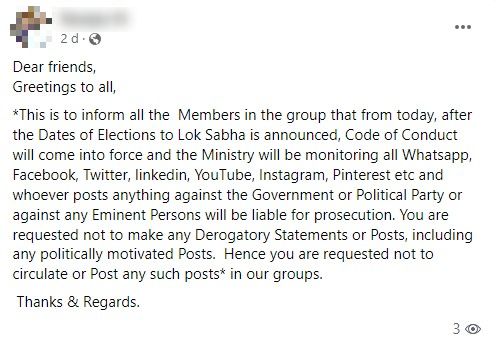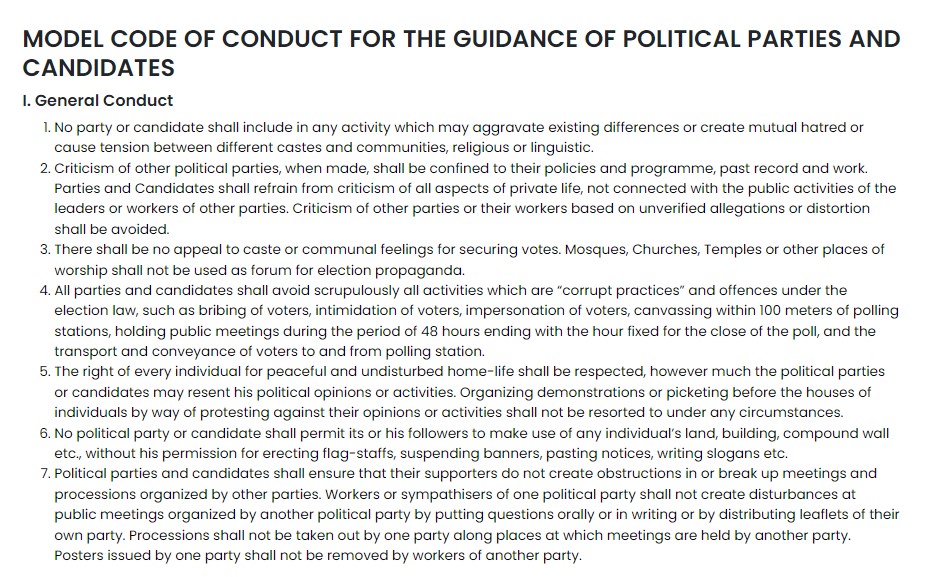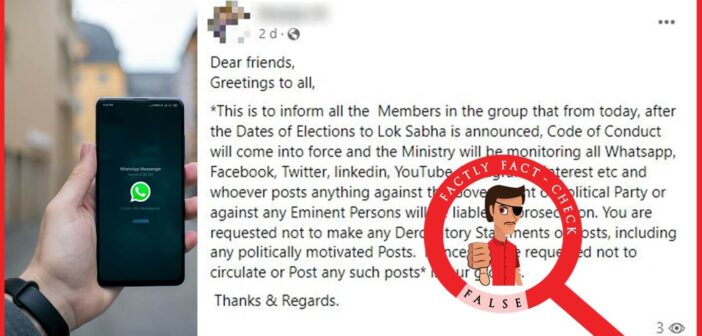The Election Commission of India (ECI) has declared a seven-phase schedule for the Lok Sabha elections, spanning from 19 April 2024 to 01 June 2024, with the results slated for announcement on 04 June 2024. Consequently, the Model Code of Conduct (MCC) is in force. Against this backdrop, a viral message circulating on social media alleges that the government is surveilling social media platforms to take legal action against users expressing dissent/politically motivated posts towards political parties/candidates. In this article, we will verify the validity of this assertion.

Claim: Government is surveilling social media platforms to take legal action against users for politically motivated posts.
Fact: Model Code of Conduct (MCC) comprises a set of guidelines issued to regulate the conduct of political parties and candidates. It does not include directives for monitoring the social media activities of citizens, nor does it suggest any form of prosecution. Importantly, the MCC lacks statutory support. Hence the claim made in the post is FALSE.
Following the implementation of the Model Code of Conduct, the Chief Election Commissioner has urged all political parties to diligently observe its guidelines, which outline a set of rules and regulations for leaders and parties in the lead-up to elections.
Model Code of Conduct:
Essentially, the Model Code of Conduct (MCC) comprises a set of guidelines issued to regulate the conduct of political parties and candidates in the lead-up to elections. These regulations encompass various aspects including speeches, polling procedures, conduct at polling booths, portfolios, the content of election manifestos, processions, and overall behaviour to ensure the fairness and integrity of elections.
Generally, the MCC encompasses eight provisions covering aspects such as general conduct, meetings, processions, polling procedures, management of polling booths, presence of observers, the conduct of the party in power, and guidelines for election manifestos. Factly has previously produced explanatory stories and videos elucidating the MCC, which can be accessed here and here.

Nevertheless, the Model Code of Conduct (MCC) does not include directives for monitoring the social media activities of citizens, nor does it suggest any form of prosecution. Importantly, the MCC lacks statutory support, implying that individuals who violate it cannot be legally pursued under any clause of the code. However, the Supreme Court has consistently upheld the MCC in various instances.
While law enforcement agencies and relevant authorities consistently monitor social media platforms to prevent misuse, this practice will persist independent of the Model Code of Conduct (MCC) or the electoral process.
Ahead of the forthcoming general elections, the Election Commission of India (ECI) has unveiled plans to combat misinformation and false narratives disseminated through social media platforms. The commission has revealed the introduction of the “Myth vs Reality” initiative aimed at tackling the spread of fake news online. As part of this initiative, state officials tasked with monitoring social media will be empowered to take down deceptive and inaccurate posts under the provisions outlined in sections 69 and 73 (b) of the Information Technology Act, 2000.
To sum it up, the ECI did not announce plans to prosecute people for social media posts under the Model Code of Conduct.



